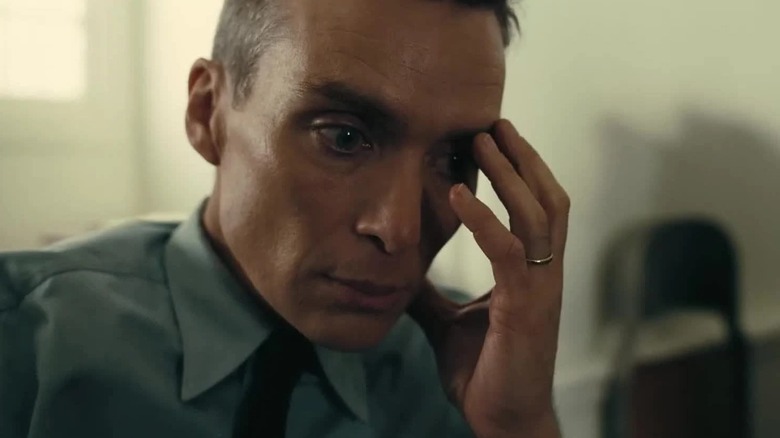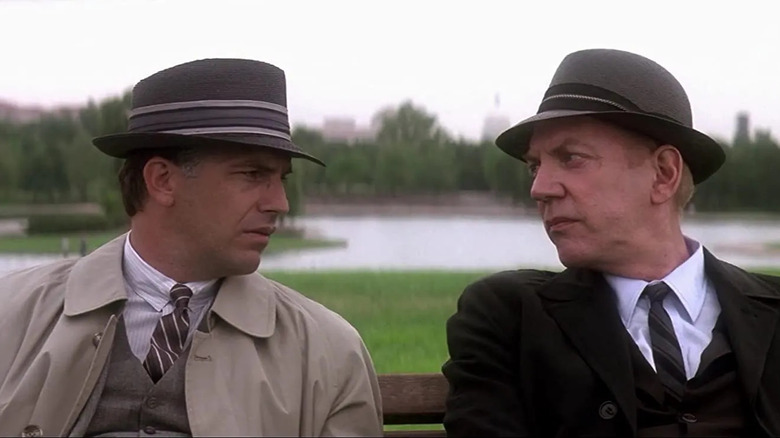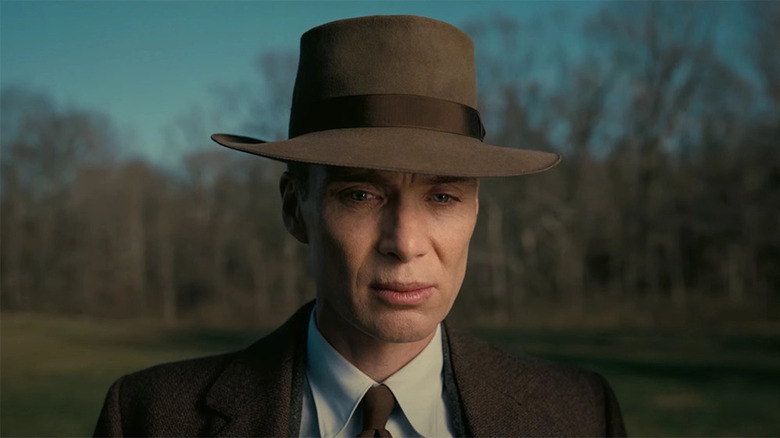Oppenheimer Refuses To Bow To Any Biopic Cliche
Spoilers for "Oppenheimer" follow.
"Oppenheimer" is not the first time Christopher Nolan has made a historical film — he touched on a very different portion of World War II with 2017's "Dunkirk." However, his latest is the first time he's made a biopic. A movie about J. Robert Oppenheimer (Cillian Murphy), Father of the Atomic Bomb, actually tracks with Nolan's interests and previous films. Consider the nuclear MacGuffin in "The Dark Knight Rises," or how Nolan centers the stories of "Interstellar" and "Tenet" in experimental physics. While "Oppenheimer" may not be a story of Nolan's own making, it is definitely a Christopher Nolan film.
"Oppenheimer" pulls from "American Prometheus," a 700+ page tome boasting Robert Caro-level research. That title refers to the Greek myth about a Titan who stole fire from the Gods and gifted it to man, which the film acknowledges with text recounting that ancient story. Fire holds both great constructive and destructive power, so Prometheus is a fitting epithet for Oppenheimer — one that shows the film's perception of him.
Biopics are typically celebrations of their subjects, whereas "Oppenheimer" is a critical study. After all, he was an important figure who changed the world, but not exactly for the better. Nolan's foremost interest is in how the modern, post-nuclear world was created; he uses Oppenheimer as the lynchpin and POV to tell that story, which winds up being far more rewarding than just a typical drab biopic.
Relevant parts of the story
One argument about biopics is that too many simply offer surface-level insight, recounting their subjects' lives but not peeling back the layers. In turn, some contest that the best biopics focus on only particular parts of a subject's life. Think Steven Spielberg's "Lincoln," which only takes place at the tail-end of the U.S. Civil War up to the eponymous President's assassination, or David Fincher's "The Social Network," about the early days and fallout of Mark Zuckerberg creating Facebook. A more narrow frame around the story allows it to dig deeper. Biopics that try to tell a subject's entire life in just a couple hours inevitably fall back on shorthands, resulting in a feeling of "if you've seen one, you've seen 'em all."
Take "Walk Hard: The Dewey Cox Story," a faux-biopic that mercilessly skewers films about famous musicians (see: "Walk The Line," Ray," etc.). "Dewey Cox has to think about his entire life before he plays," we're told, as we're treated to comical flashbacks of his childhood across his rise and fall as a musician.
While the scope of "Oppenheimer" isn't limited, it is focused. We see only the relevant parts of Oppenheimer's life — early academia, the creation of the nuclear bomb at Los Alamos, and the bomb's fallout on his life. There are no glimpses of his childhood with canned profundity about what sparked his interest in physics; the youngest we see "Oppy" is when he's already a student at Cambridge. The early scenes about his dalliances with Communism and his romance with Jean Tatlock (Florence Pugh) avoid irrelevance because those relationships become the nail in Oppenheimer's coffin when his security clearance is revoked. In "Oppenheimer," each detail is part of a larger tapestry.
Structure
It's easy to see why biopics can fall back on montages; they're the easiest way to condense information in cinema. "Oppenheimer" isn't immune — it even has the framing device doubling as a narrative endpoint. However, these montages are more multilayered than just flashbacks leading up to the present or even a back-and-forth structure. Nolan compared the scope of "Oppenheimer" to Oliver Stone's "JFK." The comparison makes sense, from the shared 3-hour running times, how every character in either film is played by a name actor and the mile-a-minute collage-style editing.
Nolan and his editor Jennifer Lame don't go so far as to splice in real news footage. But they do include shots of astrophysical reactions in a black void interspersed with silent shots of Oppenheimer, showing how the wonders of the universe fill his thoughts. Plus, non-linear editing is nothing new for Nolan. Take "Batman Begins" (the first hour is flashbacks interspersed with the present), "The Prestige" (the story is told as a layer within a layer within a layer), or "Dunkirk" (three simultaneous timelines, all unfolding across different spans). The structure of "Oppenheimer" feels more like a directorial flourish than a biopic cliche.
While "Oppenheimer" jumps across time and space as the film pushes forward, we're grounded in the same perspectives, Lewis Strauss (Robert Downey Jr.) and Oppenheimer himself. The pacing is designed around understanding these men, not condensing their lives to bullet points. Despite following him across decades, we never miss a beat in Oppenheimer's character.
The ending
Biopic endings often tie everything together in a nice bow; either a rapturous moment of triumph or the lead's somber last breath. Then there's a text epilogue, giving the audience information on what happened to the subjects after the film's events. "Oppenheimer" has neither.
Early in the film, Oppenheimer talks with Albert Einstein (Tom Conti) at Princeton University. The ending returns to this moment, finally showing us what they talked about: Oppenheimer's own legacy. The scene includes brief flashes to 1963 when Oppenheimer receives the Enrico Fermi scientific award from President Lyndon Johnson— some members of the cast are dressed up in old-age make-up, evoking lesser biopics.
But then it returns to that conversation, where Oppenheimer tells Einstein that, by building the bomb, he probably did start a chain reaction that will destroy the world. The last 60 seconds are cross-cuts between images of nuclear bombs and a close-up of Oppenheimer's face, him pondering the future he helped build before a harsh cut to black.
The later details of Oppenheimer's life aren't important, at least for this story. No, what matters is for the rest of his days, he had to live with what he created — and so do all of us. We likewise don't need it spelled out in writing that Oppenheimer's legacy remains controversial. Relying on visuals instead of explanatory text also forces the audience to think — raw facts can only take you so far. Were Oppenheimer's scientific breakthroughs and a swifter Allied victory in World War 2 worth it when nuclear armageddon could be around the corner? I know what the film and Oppenheimer the character think, but only you can decide for yourself.



